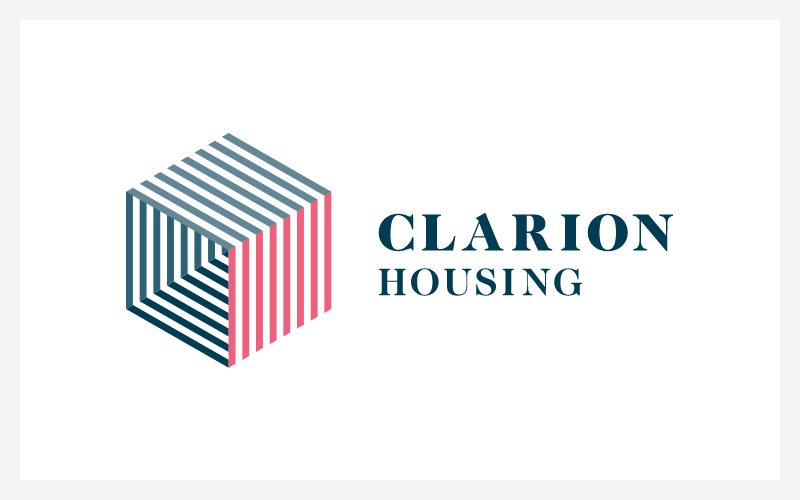NHMF Awards 2022 - Best Net Zero Carbon Initiative Shortlist : Clarion
What is the project? Clarion's Social Housing Decarbonisation Fund (SHDF) Demonstrator project is delivering zero carbon retrofit to 120 homes in Fenland and Tonbridge. Clarion partnered with Fenland District Council and Tonbridge & Malling Borough Council to successfully secure £4.5million of funding from the Department for Business, Energy and Industrial Strategy, and the retrofit work is being delivered by United Living and Equans

What is innovative about the project?
This SHDF Demonstrator project is ground breaking in respect of high-quality net zero carbon retrofit delivered at speed and at scale. It has already provided excellent learning for the sector as a whole. 120 hard-to-heat properties in Fenland and Tonbridge will be made net zero carbon-ready by a focus on fabric first measures. Co-created and collaboratively delivered by Clarion, its consultant and contractor partners, to push the boundaries of deep retrofit and gain deeper understanding of what it will take to bring its whole portfolio up to a zero-carbon ready state. Through an understanding of product, process and supply chain innovations to set the foundation for Clarion’s Retrofit Supply Chain Ecosystem for the next 30 years, delivering zero carbon ready retrofit homes at scale. Works include enhanced external wall insulation, air tightness, new ventilation techniques, ASHP and roof-system solar PV solutions, with detailed monitoring applications. Implementing the new PAS 2035 framework at scale to produce high quality retrofit with a plan for every home developed over the medium term. Utilising latest retrofit technologies (such as utilisation of Thermo-Trac for sub-DPC EWI work and Purple Passive liquid membrane for airtightness), together with the associated new delivery/installation approaches required. There will be a:
- Forward-thinking approach to contracting for the project – Clarion’s long-term partnership arrangement for Planned Investment allowing for delivery at speed and scale, and ability to withstand and quickly resolve challenges.
- Progressive knowledge-sharing approach at each stage to maximise improvements in knowledge, skills, efficiencies, cost and quality, and create an optimised blueprint for future projects.
- Adaptive approach to integration of external retrofit funding schemes with Clarion’s long-term investment planning for net zero carbon retrofit of the stock.
A trail-blazing project forming part of the government’s plan for Green Industrial Revolution and catalysing a national wave of works essential for reaching Net Zero across the Housing sector. If the savings in delivery costs already identified by this project were applied to 50% of the social housing stock in the UK requiring retrofit, this could represent a potential saving of £15billion for the sector as a whole. Co-creation has been key to the project with strategic consultancy support provided by Baily Garner and technical retrofit consultancy provided by Enhabit. The project team meets fortnightly to share progress and knowledge-sharing meetings, and three full day workshops have been held to fully explore the risks, lessons learned and innovations.
The project used asset profiling to identify the most suitable properties for retrofit works and to minimise delays in delivery. The property selection and retrofit specification also sought to avoid regret-spend in terms of matching EWI with roofing and glazing replacement cycles, ensuring its fabric-first approach is advanced enough to meet net zero standards. It is also an exemplar in demonstrating the benefit of strong long-term partnership arrangements between client, contractors and wider delivery team.
It has demonstrated enhanced engagement with customers before (reducing refusals), but also after, work. Embedding behavioural change effectively has been vital for successful retrofit, and a great deal of thought and effort has gone into designing the customer journey through the change curve.
What are the measurable benefits to the client, the contractor, the resident and the neighbourhood?
This SHDF Demonstrator project is providing substantial benefits for all the partners due to the significant learning that is taking place on the project as well as the many positive outcomes associated with the low carbon retrofit of the 120 homes.
Benefits to Clarion (client):
- Substantial improvement in condition (and financial value) of 120 retrofitted homes and the development of a blueprint for zero carbon-ready properties
- Huge increase in knowledge and experience of retrofitting homes to deliver net zero carbon targets (and of delivering retrofit to the high standards demanded by PAS2035)
- Vital learning for the roll-out of zero carbon retrofit across its stock
- Large reduction in carbon emissions (average saving per property thus far = 2.9 tonnes), and warmer homes without damp and mould
- Unprecedented understanding of how its retrofitted properties perform as a result of long-term monitoring of performance
Benefits to Contractors:
- Huge increase in knowledge and experience of zero carbon retrofit, and a chance to innovate (in terms of both product selection and also process/ delivery approaches)
- Development of the supply chain for net zero carbon retrofit at scale
- Enhanced understanding of retrofit delivery and costs, enabling more competitive and complete bidding
- Essential learning of delivering high quality retrofit to the PAS2035 standard
- Vital learning about avoiding thermal bridging during the installation of external wall insulation and about how to install air tightness measures (combination of liquid vapour control, membrane vapour control and tape in this project).
Benefits to Residents:
- Significant reduction in fuel bills for all the residents due to the vastly improved building-fabric of the properties and the free electricity from the PV panels (estimated up to £500/year)
- Mitigation of potential damp and mould in the future
- Warm, energy-efficient, comfortable homes with new components (high spec windows and doors, solar panels, heat pumps, improved ventilation and smart thermostats).
- Guidance and support on how to reduce costs and live in a more sustainable way in the long term.
Benefits to Neighbourhood:
- Growth of low carbon sector (green economy) in the two areas (Tonbridge and Fenland) with an increase in jobs and apprenticeships for the two areas (68 jobs and apprenticeships estimated overall)
- Strengthened community engagement and education about net zero carbon homes and sustainability in general
- Improvement to the streetscape of the local area due to the improved appearance of the homes receiving works.
What are the financial costs and measurable cashable benefits over a defined time period?
The overall cost of the project is £9M (50% funded by BEIS and 50% by Clarion), which has identified the following measurable benefits:
Clarion/Contractors – Project delivery team have already identified and implemented numerous measures and approaches that have reduced the overall costs of zero carbon retrofit for the properties involved in the project. They have delivered an estimated saving of £3-5K/home by using the Thermo-Trac product during installation of the external wall insulation (specialised approach to taking the EWI below the DPC level to avoid thermal bridging at ground level). They have also delivered an estimated saving of £2K/home by identifying a new airtightness product which will be much easier to install and should reduce the number of trades required during application (as the installation of air tightness membranes was very labour intensive for the initial properties in the project). Broadly speaking, this project has already reduced our overall zero carbon cost by £480m over the next 30 years.
Residents – Savings in retrofitted homes are very substantial and residents are expected to benefit from a 50% reduction in heating and hot water costs, an estimated annual saving of £440 (based on SAP calculations). In addition, the PV panels are expected to provide approximately £200 worth of electricity for each home annually. Over the next 30 years this will amount to over £2.3 million worth of savings for the residents involved in the project.
How relevant is this as an example that might be followed by other organisations?
Clarion’s SHDF Demonstrator project is ground breaking in respect of high-quality net zero carbon retrofit delivered at speed and at scale, and has already provided excellent learning for the sector as a whole. The project partners have been actively disseminating knowledge and lessons from the project with their sector networks and contacts, and Clarion has been feeding lessons learned directly to BEIS. Through this learning, the project has produced a number of Practice Notes and Technical Notes highlighting key approaches for reducing thermal bridges during retrofit that have been disseminated to the sector via the BEIS retrofit learning community. It has also worked with the Retrofit Academy in the implementation of PAS2035 and has ensured a consistent application of PAS2035 by all the project partners across all 120 homes. The project has demonstrated enhanced engagement with customers before (thereby reducing refusals), but also after, the works. Embedding behavioural change effectively has been vital for successful retrofit, and a great deal of thought and effort has gone into designing the customer journey through the change curve.
Description
120 hard-to-heat properties in Fenland and Tonbridge will be retrofitted to make them net zero carbon ready with a focus on fabric first measures. The project partners have been actively disseminating knowledge and lessons from the project with their sector networks and contacts, and Clarion has been feeding lessons learned directly to BEIS. The project is trialling advanced retrofit at scale, and thereby helping to lay down the foundations for the roll-out of zero carbon retrofit across Clarion’s stock. As Clarion is the largest housing association in the country with 125,000 homes, it has a responsibility to take a leadership role for the sector. There has been significant learning during the project about how to improve the thermal envelope of different archetypes to deliver the performance required for zero carbon retrofit. Based on this learning the project has produced a number of Practice Notes and Technical Notes highlighting key approaches for reducing thermal bridges during retrofit that have been disseminated to the sector via the BEIS retrofit learning community. The project has used asset profiling to identify the most suitable properties for retrofit works and to minimise delays in delivery. The property selection and retrofit specification has also sought to avoid regret-spend in terms of matching EWI with roofing and glazing replacement cycles and ensuring our fabric-first approach is advanced enough to meet net zero standards. The project is also an exemplar in demonstrating the benefit of strong long-term partnership arrangements between the client, contractors and wider delivery team. If the savings in delivery costs already identified by this project were applied to 50% of the social housing stock in the UK requiring retrofit, this could represent a potential saving of £15billion for the sector as a whole. Co-creation has been key to the project with strategic consultancy support provided by Baily Garner and technical retrofit consultancy provided by Enhabit. The project team meets fortnightly to share progress and knowledge-sharing meetings, and three full day workshops have been held to fully explore the risks, lessons learnt and innovations. The project has also worked with the Retrofit Academy in the implementation of PAS2035 and has ensured a consistent application of PAS2035 by all the project partners across all 120 homes. The project has demonstrated enhanced engagement with customers before (thereby reducing refusals), but also after, the works. Embedding behavioural change effectively has been vital for successful retrofit, and a great deal of thought and effort has gone into designing the customer journey through the change curve.
Note: This is part of series of Best Practice articles and case studies that the NHMF is producing.
NHMF hosted a webinar on The Social Sector Response to Zero Carbon on 12 October. You can see the presentations at: https://www.nhmf.co.uk/training. Further webinars will be planned for 2022.


